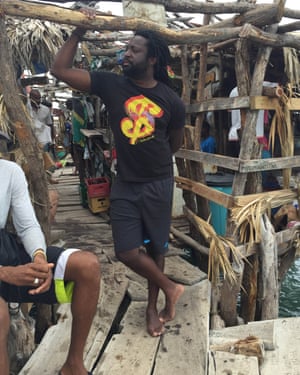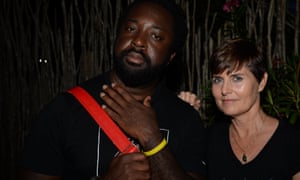By: Robert McCrum - The Guardian
In Britain, literary festivals ply their trade in tents, church halls and dusty hotel ballrooms. At Calabash in Jamaica – a festival that rivals Hay, Bath and Cheltenham – the action takes place on Treasure Beach under a tropical sun, in a profusion of Caribbean largesse.
Calabash is free, in all senses, and especially for its audience which this weekend will number between 3,000 and 4,000. Festivalgoers have been making their way here from all over Jamaica, especially Kingston and Montego Bay, by bus, taxi, car and moped. Backpackers, beach bums, drifters and seraphic Rastafarians mingle with mystified tourists, film producers and government ministers in a littoral detonation of cultural excitement.
This biennial Jamaican literary event has become so popular, indeed, that this latest audience, whose revels were due to end on Sunday night, will sign up for Calabash 2018 sight unseen, so addictive is the experience of sitting under canvas in the shade to listen to a parade of novelists, storytellers and poets from across the English speaking world. One of the first to turn up at Treasure Beach at the turn of the millennium was the young Marlon James, now renowned as the Booker prizewinning author of A Brief History of Seven Killings, a brilliant tour de force in the Jamaican dialect.
On Sunday, James is the headline event at Calabash, whose slogan for 2016 is “Fruition”, expressed in patois, a homage to its hometown hero, as Fruu-ish-aan. The current Calabash lineup celebrates the prodigal variety of English language poetry and prose worldwide, including Nigeria’s Chigozie Obioma, India’s Tishani Doshi and New Zealand’s Booker winner Eleanor Catton. But it is James who fills the limelight. Speaking exclusively to the Observer shortly before his appearance, he is affable but weary. The post-Booker year has been “weird and wild”, he says. After turning his back on Jamaica for its homophobia, and making a new life in the US (he teaches at a liberal arts college in St Paul, Minnesota), he’s found himself returning here more regularly. “This is my third visit this year.” His former battles have been won. “You can say that Jamaicans like success,” he observes sardonically.
Recent festivals have seen appearances by Zadie Smith, Colm Tóibín, Junot Diaz, Michael Ondaatje and Chimamanda Ngozi Adichie, and Nobel laureates Wole Soyinka and Derek Walcott. Calabash veterans recall with awe the occasion that Walcott launched a rhetorical fusillade against local bete noire VS Naipaul. More laidback Calabash aficionados might recall Salman Rushdie’s mastery of the ping-pong table.

Calabash is part of a vogue for the exotic and the international. Ever since the Hay festival branched out overseas in Cartagena, Colombia, back in 2006, literary festivals have been going global, like the English language. The marriage of international literary stars with local audiences in sunny destinations has inspired an unprecedented surge in book tourism, from Jaipur and Shanghai to Byron Bay, Australia. With the export of festival UK, ambitious writers today might be advised to carry a pen and a passport.
On closer examination, however, Calabash, some three hours west of Kingston, which burst into exuberant life last week, is as Jamaican as rum or Red Stripe, and every bit as intoxicating. Its signature theme is audience participation. The festival has pioneered “open mic” sessions between more formal readings at which would-be poets and storytellers can enjoy a moment in the spotlight.
The co-founder of Calabash, Justine Henzell, comes from a white Jamaican family with deep roots in the national culture. In 1972, Perry Henzell, her late father, directed the Jamaican crime classic The Harder They Come, a film that, after its successful Jamaican release, clinched a remarkable international market and has been described as one of the most important films from the Caribbean.
Henzell, for whom promoting Jamaica runs in the family, is the voice of this festival. “Does anyone not come to Calabash?” she exclaims when questioned about her audience. “Only this morning, we had a woman from Oslo who had landed at Montego Bay and asked the immigration authorities how to find us. They phoned for directions to Treasure Beach.”
A literary festival with words and music braided together (each day closes with a thunderous live concert), Calabash celebrates Jamaican cultural self-confidence with a free spirit. Henzell again: “At Calabash all my authors feel like rock stars, and the audience really trusts us to programme a great lineup. I’m really proud of what we offer, showcasing Jamaica.”
The all-important “free” aspect comes at a price. Henzell relies on corporate sponsorship and government grants, like festival administrators everywhere. Soft power has been seductive, and promoting Jamaican cultural identity has become progressively easier since the festival’s founding in 2001. “Everything here is about word of mouth. The world has now caught up with what we knew already,” says Henzell.

Jamaica has sponsored many strange English literary rendezvous, and Calabash plugs into that tradition. Ever since Captain Wentworth breezed into the opening pages of Persuasion in 1817, to add a frisson of romantic excitement to Jane Austen’s last novel, Jamaica has been adding the thrill of jeopardy to English literary life.
In the 20th century, the island provided an exotic backdrop to several English classics, from A High Wind in Jamaica to Dr No and Wide Sargasso Sea.
Books are one thing; literary life is something else that Jamaica has excelled in. The island has long played host to many English and American writers, for instance, Ian Fleming, and his contemporary Noël Coward, the young Truman Capote, William Styron, James Jones (From Here to Eternity) and even Winston Groom, author of Forrest Gump. Alex Haley is said to have written parts of his bestseller Roots near Jakes hotel, the Henzell family’s romantic beachside retreat, which also sponsors the Calabash festival.
After these postwar literary grandees, who played truant in the Jamaican sunshine alongside Hollywood stars such as Grace Kelly, Clark Gable and Bing Crosby, there came a new flowering of indigenous Caribbean literature, led by writers such as the novelists John Hearne (Voices Under the Window), Jean Rhys and Roger Mais, and poets such as Walcott and Kamau Brathwaite. Their work became subsumed into that now unfashionable genre known as “Commonwealth writing”.
This post-colonial model, promoted as much from London and New York as from Kingston, had virtually no appeal to the next generation of poets and novelists who were coming of age in the years after the death of Bob Marley.
When Calabash was set up in 2001, part of its inspiration was both to give a platform to the best international English-language writing available and also to show would-be Jamaican writers the example of poets and novelists working at the top of their craft – “to hear the best of the best,” says Henzell, “and to be inspired by that.”
Fifteen years or so after his first visit, Marlon James is full of gratitude for Calabash, its writers’ workshop, and open-mic sessions. It was through the festival that he got taken up by Kaylie Jones, daughter of James Jones, who edited James’s first novel, John Crow’s Devil.
Calabash gave him his break, but he won’t be settling back here any time soon (“I have a really good paying job in America”) and he still has plenty of attitude. “Jamaica does not support its writers like Trinidad,” he says. “The literary life is not sustainable here. This remains a conservative culture.” Talk of Trinidad inevitably brings up VS Naipaul, and he becomes reflective: “Now there’s a cautionary tale,” he says.
Comments